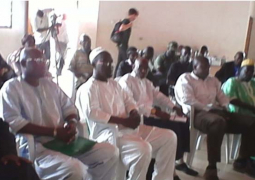Interestingly, in their philosophical theorizing and speculation on rights, relativists, who regard all principles about ‘truth’, ‘morality’, and ‘rights’ to be doubtful, disallow doubt or even enquiries about their philosophical and human rights fundamentals. They speak of worldwide standards of human rights, global charters, and discovery of liberal human rights. In these global standards, these discovered rights are discussed as absolute, unconditional assertions. This is great enigma that must be solved by the ‘Party of Skeptics and Relativists’ in the ‘Parliament of Knowledge’!
Second, the truth is that tolerance cannot be achieved using the ladder of relativity. Quite the opposite, advocates of aggression can legitimize their aggressiveness using this theory since it can be asked: if all knowledge is relative, then by what logic can we consider aggression to be a general, absolute evil? If there is no clear, arbitral truth beyond individual taste or understanding and if everyone has the right to their own personal interpretations and preferences without there being any absolute criterion for judgment, we must give aggressive and despotic persons the right to utilize their own interpretation. Thus, relativism justifies violence and tyranny. If one considers all criteria to be unwarranted and non-inclusive and regards no view to be provable, and if one does not even consider the most basic rules of knowledge and morality to be acceptable believing in on self-evident, constant, and necessary essence, then what ‘truth’ is it that aggression might crush under its feet? What benefit does this fluid truth have for humanity that anyone can claim or debunk and no one can claim or debunk at the same time? What is this natural right and human privacy spoken of that is in danger from aggression?
Third, by diminishing truths and moral values in the minds of people self-serving human instincts enter the scene like unleashed wild beasts. To explain, with the denial of all truths and moral values, human instincts are left unbound. As a result, without any philosophical or moral enquiries, in order to satisfy these instincts people resort to aggression and by doing that, sow the seeds of thousands of other belligerent acts by other people. The reality of the Western liberalist world is a testament to this truth. Why are the relativistic liberal societies of today among the most violent and unsafe human societies in the modern world, displaying sustained aggression both against themselves and against others? Has the relativist paradigm not institutionalized aggression in the contemporary world?
Indeed, a regime that considers itself only responsible for the welfare of citizen and does not recognize morality, the order of truth and falsehood, and the system of spiritual happiness and adversity as criteria of communal life can have no other fate.
Radical emphasis upon relativity of all humane and moral principles and all social structures changes the map of morality and truth into something mercurial. This is negation of morality, which can have no end but aggression (see: Kitab Naqd, issue 14-15, pp. 24-30)
CRITIQUE OF PLURALISM
First, the claim of pluralism lacks any grounds and it contradicts rational requisites and axioms as well. In many cases, there are contradictions between the claims and beliefs of religions. To judge any one of these religions to be true would necessitate a contradiction, which is at odds with axiomatic reason. For instance, how can one postulate that the Islamic tawhid (i.e. monotheism), the Christian Trinity, and the Zoroastrian duality are all true? Likewise, how can one say that the beliefs of the Jews, Christians, and Muslims that, respectively, Moses (‘a), Jesus (‘a), and Muhammad (s) are prophets of, are all true? Alternatively, how can the Christian beliefs that Jesus (‘a) is the son of God and the emphasis of Muslims that he is not the son of God both be true? Or, how can the account of the crucifixion and resurrection of Jesus (‘a) believed by Christians and is rejection by Muslims both be true? How can the Protestant belief that deems salvation to lie in faith in Jesus and his sacrifice and the Catholic belief that consider, in addition to faith, carrying out special rituals such as baptism to be necessary for salvation both be true?
Second, an important criticism of this theory is self-inclusion. In explanation, if all views and theories are dependent upon the characteristic and spiritual mould of individuals, then this view is included in this principle as well; that is, these views and theories are subject to the mental, spiritual, and personality frameworks of each respective person and cannot represent actual truth. Thus, in this respect there is no difference between this theory and opposing ones.
Third, this theory necessitates acceptance of relativity of knowledge or skepticism. This same criticism has also been leveled at Kant’s theory.
The criticism directed against pluralism is more severe than that made against the theory of Kant because he posited that a priori forms are the same for all intellects saying that all humans perceive world object using the same forms. On the other hand, pluralists believe that there are as many mental forms as the number of persons in existence and that each person perceives phenomena and truths corresponding with their individual mental forms. Therefore, not only is there difference between our perceptions and reality but also between the perceptions of different individuals. On this account, there are as many differing perceptions of the external reality as there are human beings. This means not increased relativity or skepticism but absolute ignorance (Subhani, 2002:30).
CRITIQUE OF HUMANISM
First, the idea of humanism in Western liberalism, denying the primacy of God as found in religions, finds its origins in the pride, selfishness, and alienation of modern man that resulted upon his achieving considerable “knowledge” and advanced technology, discovering the “causes” of natural phenomena, and the prevalence of belief in the primacy of matter. Of course, what were deemed to be the irrational teachings in the Bible about man and the hostility of the Church to scientists in the Middle Ages on account of their scientific innovations on the pretext of heresy, are also factors that have contributed to this viewpoint.
These factors gradually brought about the mindset in Western people that there is no longer any need for the presence of God either in the natural world or in human life. The humans of today feel that they have reached mature self-sufficiency and are no longer like the children of yesterday who had to hope for an invisible hand to reach out and do something. Modern humans believe they have achieved they key to solving all problems and can resolve all their difficulties by themselves. No longer is it necessary to worry about performing tasks set by God or heeding His rights upon us. Instead we must worry about our own rights-human rights. No longer must we define humans as responsible creatures but as rightful creatures. Rather than fretting over fulfilling God-given duties, we must concern ourselves with asserting over inalienable human rights.
Therefore, as noted, humanism in the West derives its basis form the pride, neglect, and rebelliousness of humans as well as inimical religious ideology and the misbehavior of religious authorities while no positive basis that is founded in reason or logic may be found for this belief.
Second, even though liberalism speaks considerably of the primacy of man, it unfortunately does not present a clear description of humanity. What manner of human sits in sovereignty and is served by all thing? For which human are the sun, moon clouds, and wind in action to serve? What are the criteria of humanity? What parameters elevate humans over mere animals?
How can human deprived of belief, faith, and morality be the greatest of all creatures and masters of universe?! Are humans merely instinctive creatures? Does our humanity derive from or our character? Are humans the noblest of all creatures and liege of the cosmos because they can control everything using technology and armaments? Does the humanity of humans, as some Western thinkers have said, come from their power and force?...
To be continued
Read Other Articles In Article (Archive)





